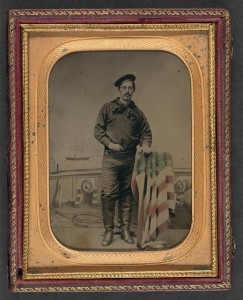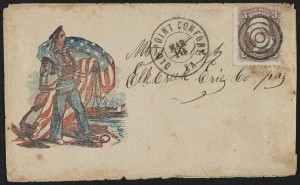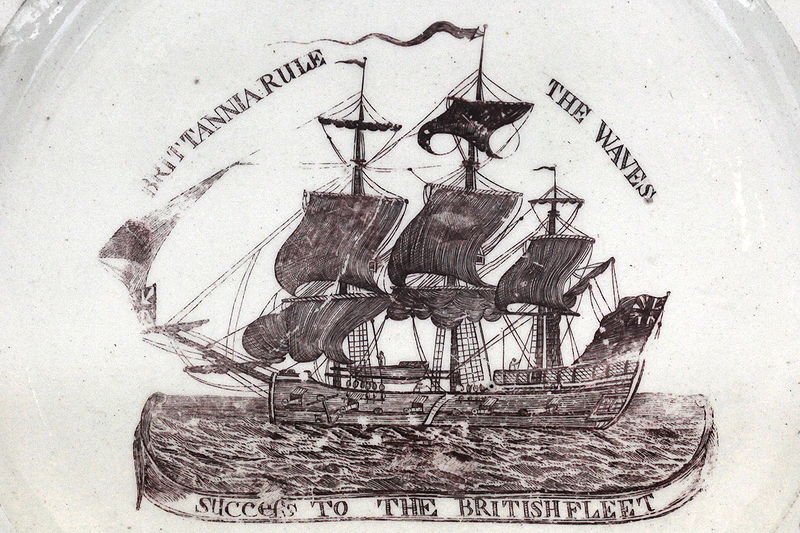The following Southern editorial questions why Great Britain was remaining neutral during the American Civil War because, if the American states had not broken up, the United States would have eventually overtaken Britain as the world’s leading maritime power. The tone seems a bit wistful – what might have been “If the fanaticism of New England had not overthrown the old Constitution and Government …”
From the Richmond Daily Dispatch January 26, 1863:
The naval power of the United States.
We have never denied that, whilst the Yankees are rather indifferent soldiers, they make very good sailors. They have had long training, and have attained great proficiency, in maritime matters.–From the moment when their enterprise in the whale fisheries extorted the eloquent panegyric of Burke to the present day, they have shown unusual aptitude for a sea life. The fishing bounties, the monopoly of the coasting trade, and the vast carrying trade between America and Europe have given full scope and exposure to their great maritime energies. If the fanaticism of New England had not overthrown the old Constitution and Government, the United States would have soon be come the first commercial and naval power of the world. A third war with England, which would have been inevitable would have transferred the undisputed capture of the seas to American bands, and the lapse of another century would have placed the Old World at the feet of the New.
But such seems not to have been the design of Providence. The nerves and sinews of that maritime power which threatened to overwhelm the earth have been abruptly sundered in the dissolution of the Union. The land which furnished Yankeedom the great staples of its commerce, which furnished it the fishing bounties that trained its seaman, and even the very live oak, pine, tar, and hemp that equipped its ships, has been lost forever to the United States. It must hereafter give up its proud ambition of being a first-rate naval and commercial power. No wonder that it puts forth such gigantic efforts in this war. Those efforts are for self- preservation, over more than for Southern subjugation. The latter is now sought as a means to an end, and that end is, to keep itself on the map of the world. It is astonishing that England, which sees and knows the[s]e facts, statedly and perseveringly maintain the position of us [so?] called neutrality, and deliberately incur the hazard of a restoration of her old rival to the capacity of inflicting upon her at a future period the ruin of her commercial and naval ascendancy. So soon as the United States triumph in this struggle, which happily is now out of the question — so soon Britancia will cease to rule the waves, and a hundred years ago [?] will become a solitary barren side of the ocean.
Edmund Burke spoke about the American whaling industry in a speech arguing for conciliation with the American colonies in the House of Commons on March 22, 1775:
…look at the manner in which the people of New England have of late carried on the whale fishery … No sea but what is vexed by their fisheries; no climate that is not witness to their toils. Neither the perseverance of Holland, nor the activity of France, nor the dexterous and firm sagacity of English enterprise ever carried this most perilous mode of hardy industry to the extent to which it has been pushed by this recent people; a people who are still, as it were, but in the gristle, and not yet hardened into the bone of manhood. When I contemplate these things; when I know that the Colonies in general owe little or nothing to any care of ours, and that they are not squeezed into this happy form by the constraints of watchful and suspicious government, but that, through a wise and salutary neglect, a generous nature has been suffered to take her own way to perfection; when I reflect upon these effects, when I see how profitable they have been to us, I feel all the pride of power sink, and all presumption in the wisdom of human contrivances melt and die away within me. My rigor relents. I pardon something to the spirit of liberty.
Rule, Britannia! was written in the first half of the eighteenth century:
“Rule, Britannia! rule the waves:
“Britons never will be slaves.”
The Britannia image is licensed by Creative Commons



